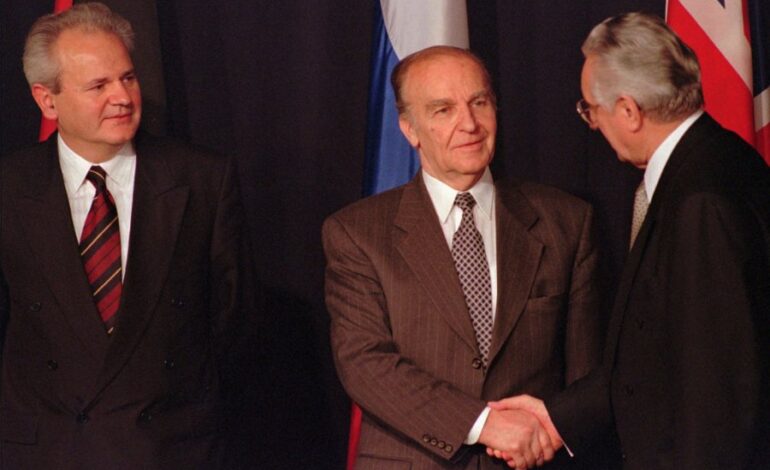Reflecting on the Dayton Accords: 30 Years of Peace in Bosnia

The Dayton Accords, a landmark agreement reached on November 21, 1995, marked the end of the Bosnian War, concluding a conflict that claimed over 100,000 lives and displaced millions in the region. U.S.-led diplomacy played a crucial role in bringing together the warring parties in Bosnia and Herzegovina, paving the way for a fragile peace that has endured for three decades.
Over the past 30 years, the Dayton Accords have served as both a foundation for peace and a source of ongoing challenges in Bosnia. The accords established a complex political structure designed to maintain stability among the country’s ethnic groups: Bosniaks, Croats, and Serbs. While the agreement effectively halted military hostilities, it also entrenched ethnic divisions within the political system, leading to ongoing tensions and disputes.
Under the leadership of U.S. diplomat Richard Holbrooke, the negotiations took place at Wright-Patterson Air Force Base in Dayton, Ohio. Holbrooke’s tenacity and strategic approach were instrumental in securing a deal that many initially thought impossible. The agreement resulted in the establishment of the Federation of Bosnia and Herzegovina and the Republika Srpska, effectively dividing the country into two entities with shared governance.
The aftermath of the Dayton Accords witnessed a significant international presence, with NATO forces deployed to maintain peace and stability. In its initial years, the implementation of the agreements faced numerous challenges, including political corruption and delayed reforms. The international community, particularly the European Union, has since played a vital role in supporting Bosnia’s efforts towards integration with European structures.
Despite the relative peace achieved since the signing of the accords, the political landscape in Bosnia remains precarious. Ethnic-based political parties continue to dominate, often prioritizing nationalist agendas over broader national interests. This has led to stagnation in necessary reforms and a lack of progress toward EU membership, which has been a long-standing goal for many Bosnians.
As the country reflects on the past three decades, the legacy of the Dayton Accords is a mixed one. While they successfully ended a brutal war, they also left behind a complex political framework that requires ongoing dialogue and compromise. The challenge remains for Bosnia and Herzegovina to navigate its way forward, balancing the needs of its diverse population while striving for a unified national identity.
Looking ahead, the international community’s role remains critical. With geopolitical tensions rising and new challenges emerging, the lessons learned from the Dayton process could provide valuable insights for future peace negotiations worldwide. As Bosnia commemorates this significant anniversary, the resilience of its people and the ongoing pursuit of stability and integration into European structures will be pivotal in shaping the country’s future.
The anniversary serves as a reminder of the importance of diplomacy, the necessity of sustained engagement, and the need for a committed approach to addressing the underlying issues that continue to affect Bosnia and Herzegovina today.






